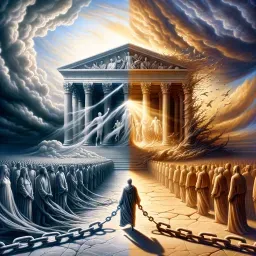”National honor is national
property of the highest value“

- Meaning
- The phrase "National honor is national property of the highest value" suggests that the collective honor and integrity of a nation are among its most precious assets. It implies that a nation's reputation, moral standing, and ethical behavior are pivotal to its identity and should be guarded and cherished as one would a valuable treasure. This emphasizes the importance of national ethos and the responsibility of its citizens and leaders to uphold and protect it.
- Allegory
- The majestic eagle represents the nobility and strength of the nation, soaring high to symbolize national pride and aspirations. The serene landscape below signifies the beautiful and bountiful nature of the nation which the eagle (symbolizing the nation) oversees and protects. The shield with symbols of peace and justice represents the key values that define national honor. The radiant beams of light symbolize the virtues of honor and integrity that illuminate and elevate the nation. This image blends symbolism and natural beauty to reflect the intrinsic value of national honor as the phrase suggests.
- Applicability
- In personal life, this phrase can inspire individuals to consider their own integrity and reputation as invaluable assets. Just as national honor is critical for a country, personal honor and ethical behavior are crucial for individuals. It encourages people to act with integrity, honesty, and respect in all their dealings, understanding that their personal honor is a reflection of their values and principles.
- Impact
- The impact of this phrase has been significant, particularly in discussions of national pride and responsibility. It has been cited in various contexts to stress the importance of a nation's moral and ethical conduct. It has served as a reminder to political leaders, diplomats, and citizens of the importance of protecting and upholding the honor of their country.
- Historical Context
- The historical context of this phrase likely dates back to the early 19th century when James Monroe was President. This period, known as the Era of Good Feelings, was marked by a sense of national purpose and a desire for unity in the aftermath of the War of 1812. The concept of national honor was particularly pertinent during this time as the young nation sought to solidify its place in the world and gain respect from other countries.
- Criticisms
- Criticisms of this phrase may revolve around the subjectivity of "honor" and how it can be interpreted differently by different cultures and political entities. Some might argue that focusing too much on national honor could lead to nationalism or jingoism, where the pursuit of national pride overshadows other important considerations such as justice, equality, and international cooperation.
- Variations
- There is a variation in the interpretation of national honor across different cultures. For example, in many Eastern cultures, the concept of honor is tightly linked to collective societal values and is often associated with family and community reputation. In Western cultures, it may lean more heavily towards individual integrity and national pride.
-

Patience and perseverance have a magical effect before which difficulties disappear and obstacles vanish.
-

If men were angels, no government would be necessary.
-

It is easier to do a job right than to explain why you didn't.
-

I tremble for my country when I reflect that God is just; that his justice cannot sleep forever.
-

It is a damn poor mind indeed which can't think of at least two ways to spell any word.
-

Facts are stubborn things; and whatever may be our wishes, our inclinations, or the dictates of our passion, they cannot alter the state of facts and evidence.
-

What is right and what is practicable are two different things.
-

Reputation is an idle and most false imposition; oft got without merit, and lost without deserving.
-

The art of war is simple enough. Find out where your enemy is. Get at him as soon as you can. Strike him as hard as you can, and keep moving on.
-

The goal to strive for is a poor government but a rich people.
No Comments